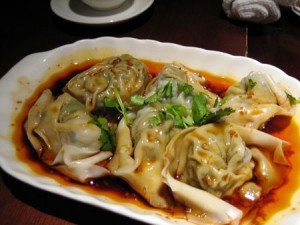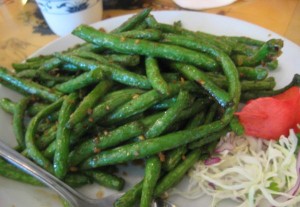As the world turns its eyes on China, and all parts of developing Asia, increasing numbers of Westerners are traveling here and getting a taste of it for themselves, literally. As tasty as the dishes may be, foreign guests have started deciding for themselves that Chinese food might just be “a little too oily to be healthy.” I’m personally biased and in favor of Asian food traditions, but I do think the argument deserves a fair bout!
Round 1, Ding!
When friends visit China their #1 concern about the food is sanitation, but also the oiliness. The picture to the right is one rather oily example. To satisfy their curiosity, and mine, I decided to ask some Chinese friends what their take is on this matter. I’ve listed their responses to common concerns that are voiced by Westerners (American friends, specifically):
1. There is simply too much oil in the food. How can this be healthy? The initial response to this question is: Yes, there is oil on the food, but we don’t eat it. It just sits in the dish. Its not like a soup you drink or a gravy that you might put on potatoes.
2. How do you avoid eating much of the oil? People here use chopsticks for food that is sitting in broth or oil. We just let most of the oil drip off of the food first. The portion of rice you eat is important too. The combination of roughly 30% staple and 50% main dish and 20% liquid (soup or water) are important to note here.
3. Doesn’t the oil get on your rice too? The oil can sometimes drip on the rice, but that is not how rice is consumed here. Normally people take pure, white, cooked rice with their food. This soaks up oil or other strong flavors from the food and protects your stomach. Fried rice is not a substitute for white rice either; and spooning the sauce of any dish into your rice is never done.
A case of misunderstanding: I remember making green beans with sausage bits and a simple cabbage dish for my family last Christmas. I also made white rice to go with it, of course. The salty/oily sauce that went in the green beans dish was irresistible to my grandmother, who is an amazing cook of Mediterranean food. But when I explained that “the rice soaks up the sauce”, she immediately tested my claim; she took a spoon and proceeded to pour the sauce over her rice… moments later… “Mmmm, it is sure does!” she said.
4. My friend went to China and gained weight. Why? The major reason Westerners gain weight in China is because of mixing food habits. We all try to assimilate to the local food culture at first, but we soon begin missing the dishes from home. Some people go back to convenient eating habits, like sandwiches for lunch. Others miss cheese and butter and other processed foods, so they might visit the foreign food store every few weeks or so. These actions have inescapable consequences.
Ben’s Opinion: Food culture is special and synergistic: more than the some of its parts. Using our own (American) nutritional logic to understand how on earth the Chinese (Koreans, Japanese, Vietnamese, etc.) could be so healthy would be a mistake. We shouldn’t use a microscope to look at how a system works. We should be looking at the big picture here. From that perspective, I would say, whatever these food cultures are doing… they are doing it right!
Please add your thoughts, comments, and rebuttals below. Thanks!

Related posts:
- The “Too Healthy” Complex I’m not sure where this all came from, but while I was growing up in Middle-America 1990s, I specifically remember...
- Rice or Bread? Ah, another timeless rivalry! Why are Asian people so thin when they eat bad-for-you White Rice all the time?? Isn't...
- Traditional Food Choices and Bitter Gourds Have you tried “Bitter Melon” (苦瓜, Ku Gwa in Chinese)? Probably not. After the first bite you’ll say “What the…...
- Great Food for $1 I would be lying if I said that eating well in China requires more than $3 or $4 per day....
- Western vs Eastern Food Choices A colleague recently asked me what the difference was between Chinese and American cuisine, besides our bread staples. I told...














A great discussion around a Sichuan dish called “Ma La Yu” is also brewing at a Fuchsia Dunlop’s blog. She makes some good points as well.
http://www.fuchsiadunlop.com/whos-calling-who-greasy/
I am glad that I inspired a blog post. Not sure I am convinced, having experienced Chinese cuisine live for myself, but I do commend your effort. Vietnamese is a personal favorite, but generally speaking if there are rice or noodles involved, I will probably enjoy it.
You are so worth a blog post Jill! ^^ Happy Birthday!